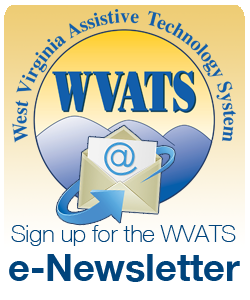Spring 2020
Download a PDF of this Newsletter.
Articles:
AT for spring cleaning
With spring comes spring cleaning. For someone with a disability, this task could be difficult. Prioritizing jobs can make it easier to decide what must be done. This can help in setting realistic cleaning goals. Remember to take breaks when needed and know your limitations.
Assistive tools can make cleaning easier. Here are a few ideas that might be helpful:
- A rolling cart or a carry all apron can help move supplies between rooms.
- Labeling cleaning supplies can help people who are blind or have low vision. A braille label maker or a bar code reader can help identify items.
- A lightweight vacuum may be easier to push. A cordless vacuum might work best for a person who uses a mobility aid. Someone with mobility issues may want a robotic vacuum like the Roomba.
- A dustpan on a long handle can make sweeping tasks easier for persons with back issues.
- An extension pole can help remove dust and cobwebs from ceilings, fans and other places that are out of reach.
- A microfiber dusting mitt may help those who have difficulties with grasping or holding a cloth.
- For organizing cupboards and closets, consider using baskets or organizers. Many organizers will pull out for easier reach.
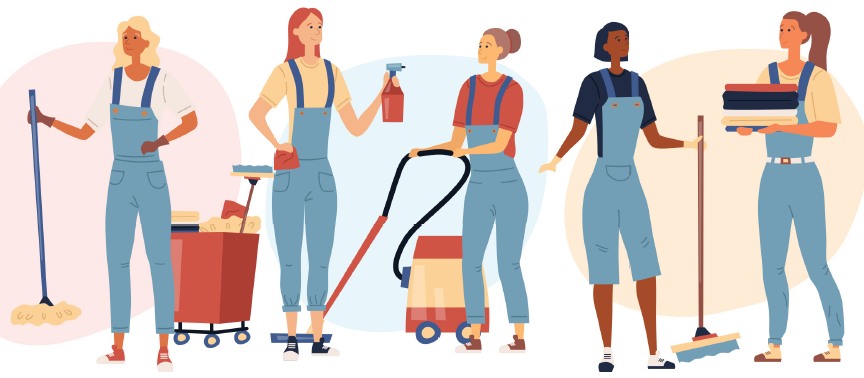
Decluttering makes cleaning easier. It also makes space for items you may need now. Think about donating clothing and household items that can be used by others to a charity. Some charities will pick up donations from homes. This provides more people with the ability to donate.
WVATS can provide more information on how assistive tools could help with your daily activities. Contact WVATS at 800-841-8436, visit our Facebook page or email wvats@hsc.wvu.edu.
Powerful Tools
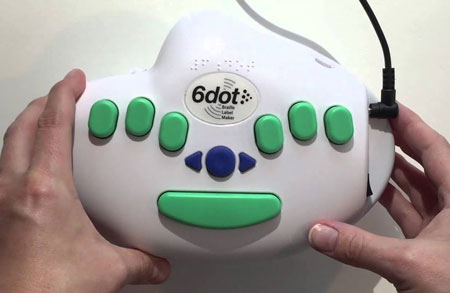
6dot braille label maker
The 6dot braille label maker has a built-in braille keyboard to create braille labels. An external QWERTY keyboard gives users who do not use braille the ability to make braille labels. The label maker cuts the labels and no scissors are needed. This helps users to identify and organize supplies and other items. A 6dot braille label maker can be borrowed from the WVATS loan library.
Pull down shelf
A pull down shelf can be installed in high cupboards to help users reach those top shelves. This can help with keeping shelves organized and supplies within reach.
Dust pan on a stick
A dust pan on a stick is a great tool that will help reduce back strain while sweeping floors. A typical dust pan requires users to bend and sweep dust into them. The stick attachment allows users to remain upright.
Microfiber dusting mitt
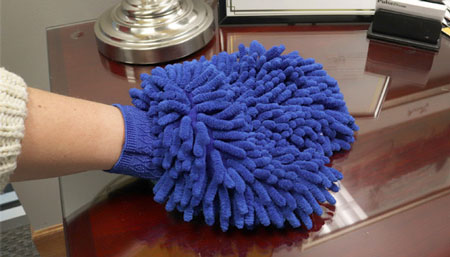
A microfiber dusting mitt can make dusting easier. By slipping over a hand, fine motor skills or grasping is not needed to hold the cloth.
For more information on these items, contact WVATS at 800-841-8436 or email wvats@hsc.wvu.edu.
Inclusive gardening
Now that spring is here, it is time to enjoy outdoor hobbies. Gardening is loved by many, but may become difficult with aging or disabilities. Assistive devices can help people enjoy the hobby again. Digging soil, moving dirt and watering plants is easier with assistive devices.
Tools designed to keep people from bending over or to use from a seated position can be a first step to gardening again. A raised bed at the right height can keep someone who uses a wheelchair growing plants for many years.
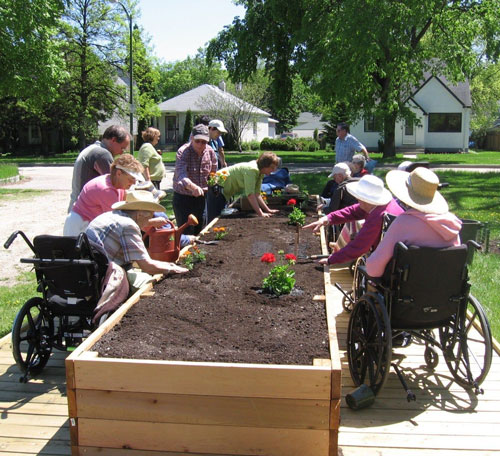
Telescopic handles on garden tools can reduce strain on the back. These are often available on pruners, trimmers, trowels and rakes. Rolling garden carts allow a person to be in a seated position and within arm’s reach to the ground. Pick a garden cart that comes with storage near the seat. This allows for the storage of garden tools, picked flowers or vegetables to be close at hand.
Some tools can allow for gardening with less pain and discomfort. Ergonomic garden tools keep your wrists in a natural position which can prevent stress on joints. Tools with arm support use forearm strength instead of the wrists. This provides more control with less fatigue. Arm supports may come built onto the tool or as a support cuff that allows the attachment of different tools.
Look in your area for a garden club or group that is inclusive to everyone. Some areas have community gardens that are made accessible to all. If you cannot find a group in your area, consider starting a community garden club. An inclusive garden should have soil and walkways that are accessible to wheelchairs. Watering plants can be done as a group or by drip hoses that carry the water for you. Enjoy your spring with beautiful flowers and tasty vegetables.
WVATS is available to discuss AT solutions that can help make gardening easier. Our loan library has a wide variety of gardening AT available to try out. For more information, call WVATS at 800-841-8436 or email wvats@hsc.wvu.edu.
Pay It Forward WV
Therapeutic and recreational equipment for children is often expensive. Most times these pieces of equipment are not funded by Medicaid or private insurance. Children also outgrow items and need new equipment. WVATS has received funding to assist families with these equipment needs.
The Pay It Forward WV program is funded by a grant from the Christopher and Dana Reeve Foundation. It will offer gait trainers, standers, activity chairs, strollers and adapted tricycles for loan to WV families in need. The items will be returned when they are no longer the right fit for the child and offered to another family. Families must be working with a physical or occupational therapist who can fit the equipment to the child.
Together we can help each other by paying it forward. The current supply of equipment is limited due to funding. WVATS also accepts donations of equipment and helps make it available to other families in need. If you have gently used equipment you would like to donate please consider donating to the Pay It Forward WV program.
If you have questions about the program or would like to apply to receive equipment, please contact WVATS for more information.

You can help
Assistive devices are often stuck in a closet or garage when they are no longer being used. WVATS accepts donations of gently used assistive devices. WVATS makes sure the devices are cleaned and working, then makes them available to others in need. If you have devices you are interested in donating, please contact us.
Campaign signs that are no longer needed can be used by WVATS for future make-n-take events. Card holders, slant boards and iPad stands are just a few of the many tools that can be made from these signs. If you know of any candidates that would be willing to donate old signs to our program, let us know.
Be sure to like and share the WVATS Facebook page to help us spread awareness of the services and resources that we can provide to the state of West Virginia.

